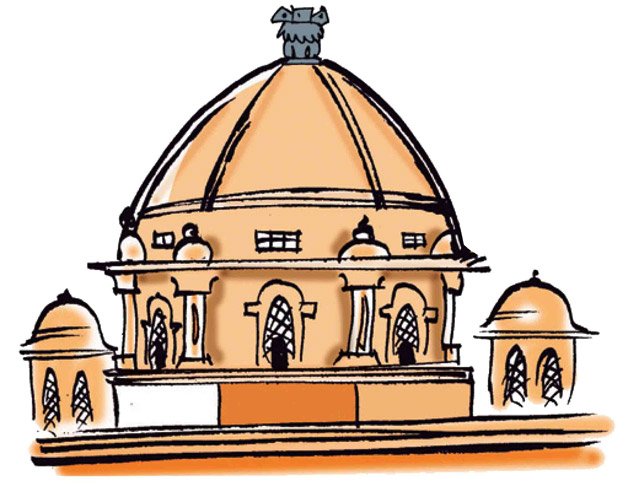WHEN we write about governance in the country, we should try to be absolutely honest, and realise at the same time that it is a privilege and have to treat it with respect. Opinions based on personal experiences with people and agencies should not cloud our vision. I know that to be brutally objective is extremely difficult, but try we must.
Unfortunately, most of our civil servants are not made that way. I have seen very senior colleagues reiterating their personal views on every issue without appreciating emerging facts. For example, a number of retired officers are extremely uncomfortable with Narendra Modi. They refuse to see anything good or progressive in Modi’s policies.

Why are bureaucrats scared of the impending entry of experts from outside the government system as Joint Secretaries in the Central Government? Are they afraid that their incompetency will be exposed when they start working alongside? Have they forgotten that they were chosen by a rigorous merit based recruitment system where many of the present day technical and managerial experts had also competed?
Why should the system operate in favour of retaining and promoting incapable career civil servants despite the ready availability of subject matter specialists in the open market? There are examples of specialists doing excellent work in government. Conversely, there are equal, if not more, number of examples of bureaucrats performing outstanding work in the private sector. Sadly, anecdotal logic can establish anything you want.
Those in favour of the move of lateral entry at higher bureaucratic policy making levels in government believe that since the generalist-administrator model of governance has failed to achieve the objectives of good governance, it is expedient to bring domain experts in various areas to formulate innovative policy instruments of development
In a Parliamentary democracy, politicians must preside over policymaking as they are supposed to know what people want. But ministers need advice—wise, impartial, objective, honest and fearless advice. In democratically governed countries like India, that comes largely from the permanent bureaucracy. However, in ministries like Finance, etc., engaging technical experts as advisors is an accepted practice.
IT is learnt that the Prime Minister’s Office has recently asked the Department of Personnel and Training to put up a proposal on the induction of outsiders at the Deputy Secretary and Joint Secretary level, in ministries dealing with economy and infrastructure. The move came in the light of a Department of Personnel report indicating a serious shortfall in the number of officers at the middle-management level.
It may be the first time for attempting lateral entrance in an organised manner, but decisions in individual cases have always been taken. There is, in fact, nothing new in inducting a suitable person to meet a particular requirement. I remember having decided to induct an academic expert as special secretary for Technical Education in the Ministry of Human Resources almost 20 years ago.
It’s undoubtedly true that a large number of civil servants with a predestined time-bound career progress get indolent and slothful affecting the over-all efficiency of the civil service. The overall reform of the civil service is, therefore, needed in furtherance of the Prime Minister’s call for ‘maximum governance’. But whether a short concept paper on Lateral Entry is irrefutable should be taken with a pinch of salt.
THE idea of bringing able people from the academic or corporate sectors into suitable positions in government is basically sound, provided it is done with sincerity of purpose and transparency. It should, for example, not become a subterfuge for inducting ‘their own’ into policy making echelons.
Those in favour of the move of lateral entry at higher bureaucratic policy making levels in government believe that since the generalist-administrator model of governance has failed to achieve the objectives of good governance, it is expedient to bring domain experts in various areas to formulate innovative policy instruments of development. Besides, the complexities of socio-economic development processes have increased manifold since the Westminster model was introduced requiring more specialised technology handlers for diagnosing and solving the problems of welfare and development.

According to some commentators, the well entrenched and sleepwalking career civil servant (read IAS) needs to be given a fright of losing his perch by introducing some credible competition from outside his tribe, which may also provide a second opportunity to bright young persons who did not/could not opt for the civil service in the first place. There appears to be a need to end the monopoly of narrow minded IAS officers in advising the political masters in how to run the government, and it will be beneficial for the system to supplement the existing bureaucracy at senior levels with new blood from outside the system.
Contrary to what is claimed by the anti-generalist body of development thinkers, it can be argued that the idea is ludicrous because it is very different to run a private enterprise and formulate policies for the government, which impact millions of people and large geographical areas. Reforms of the time honoured institutions should not be attempted in an arbitrary and piecemeal way. This is a knee jerk reform of the civil service without proper examination.
The problems of governance are much larger; first we need to address the question whether the idea of generalist-administrator has actually failed its purpose before seeking a solution. Secondly, even if the idea is accepted in principle, its implementation would present enormous problems; one of the main problems being how to avoid discretion and favouritism; thirdly, the meager salary structures in government without perks may not be enough to attract really capable specialists from the private sector.
In my view, the issue should be given a careful consideration before an irreversible decision is taken, since a decision of disturbing the precarious administrative equilibrium could lead to serious implications. Perhaps an initial pilot programme involving technical and infrastructural ministries is indicated. There are places where the government can use these lateral entrants more gainfully; for instance, they can be engaged in organisations like NHAI and DGFT. The process of inducting lateral entrants into senior positions of Civil Service should also be subjected to the same high quality of recruitment process as UPSC selection, so that unscrupulous decision makers do not take advantage and recruit people of their choice.
Prabhat Kumar is an Indian Administrative Service officer of the 1963 batch, he served as the Cabinet Secretary of Government of India between 1998 and 2000. Upon creation of the State of Jharkhand in November 2000, he served as the first Governor.

























































